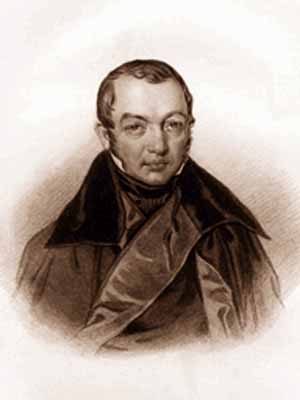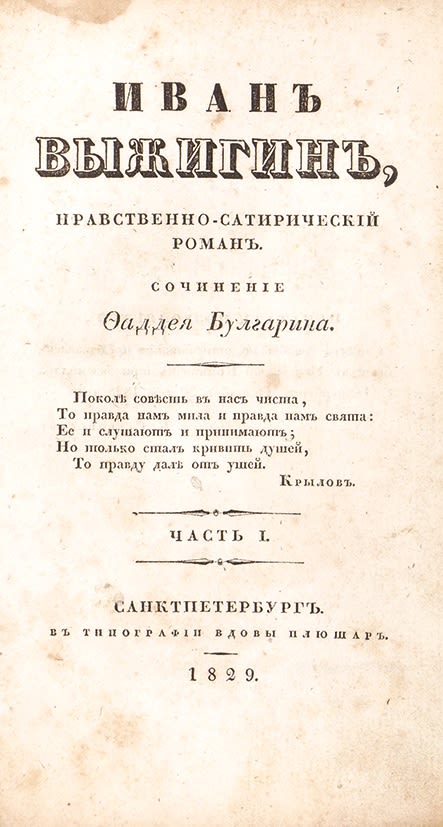|
Thaddeus Bulgarin
Thaddeus Venediktovich Bulgarin (russian: Фаддей Венедиктович Булгарин; Polish Jan Tadeusz Krzysztof Bułharyn, – ), was a Russian writer, journalist and publisher of Polish ancestry. In addition to his newspaper work, he rejuvenated the Russian novel, and published the first theatrical almanac in Russian. During his life, his novels were translated and published in English, French, German, Swedish, Polish, and Czech. He served as a soldier under Napoleon, and in later life as an agent of the Czar's secret police. As a writer his self-imposed mission was to popularize the authoritarian policies of Alexander I and Nicholas I. Life and career Bulgarin was born into a noble Polish family near Minsk, Belarus (then Polish–Lithuanian Commonwealth). His father, one of Kosciuszko's associates, was exiled to Siberia for having assassinated a Russian general. Bulgarin was educated in a St. Petersburg military school, took part in the Battle of Fri ... [...More Info...] [...Related Items...] OR: [Wikipedia] [Google] [Baidu] |
Peninsular War
The Peninsular War (1807–1814) was the military conflict fought in the Iberian Peninsula by Spain, Portugal, and the United Kingdom against the invading and occupying forces of the First French Empire during the Napoleonic Wars. In Spain, it is considered to overlap with the Spanish War of Independence. The war started when the French and Spanish armies invaded and occupied Portugal in 1807 by transiting through Spain, and it escalated in 1808 after Napoleonic France occupied Spain, which had been its ally. Napoleon Bonaparte forced the abdications of Ferdinand VII and his father Charles IV and then installed his brother Joseph Bonaparte on the Spanish throne and promulgated the Bayonne Constitution. Most Spaniards rejected French rule and fought a bloody war to oust them. The war on the peninsula lasted until the Sixth Coalition defeated Napoleon in 1814, and is regarded as one of the first wars of national liberation. It is also significant for the emergence of larg ... [...More Info...] [...Related Items...] OR: [Wikipedia] [Google] [Baidu] |
Ivan Vejeeghen
''Ivan Vejeeghen'' (Russian: Иван Выжигин) is an 1829 satirical Russian novel by Thaddeus Bulgarin. It is in the form of a memoir of one Ivan Vejeeghen (or Vyzhigin), a peasant orphan growing up in early 19th century Russia. The novel is considered to be the first best-seller in Russia, outselling more literary authors such as Pushkin Alexander Sergeyevich Pushkin (; rus, links=no, Александр Сергеевич ПушкинIn pre-Revolutionary script, his name was written ., r=Aleksandr Sergeyevich Pushkin, p=ɐlʲɪkˈsandr sʲɪrˈɡʲe(j)ɪvʲɪtɕ ˈpuʂkʲɪn, .... The first edition sold out in seven days, and seven thousand copies before the end of the year; more than ten thousand were sold overall. By 1832 it had been translated into French, Polish, German, Swedish, Italian, Dutch, Spanish, and English (an English version was published London in 1831 and in Philadelphia in 1832), and was one of the first works of Russian literature to be widely re ... [...More Info...] [...Related Items...] OR: [Wikipedia] [Google] [Baidu] |
Sir Walter Scott
Sir Walter Scott, 1st Baronet (15 August 1771 – 21 September 1832), was a Scottish novelist, poet, playwright and historian. Many of his works remain classics of European and Scottish literature, notably the novels '' Ivanhoe'', '' Rob Roy'', ''Waverley'', ''Old Mortality'', '' The Heart of Mid-Lothian'' and ''The Bride of Lammermoor'', and the narrative poems '' The Lady of the Lake'' and '' Marmion''. He had a major impact on European and American literature. As an advocate, judge and legal administrator by profession, he combined writing and editing with daily work as Clerk of Session and Sheriff-Depute of Selkirkshire. He was prominent in Edinburgh's Tory establishment, active in the Highland Society, long a president of the Royal Society of Edinburgh (1820–1832), and a vice president of the Society of Antiquaries of Scotland (1827–1829). His knowledge of history and literary facility equipped him to establish the historical novel genre as an exemplar of Europ ... [...More Info...] [...Related Items...] OR: [Wikipedia] [Google] [Baidu] |
Epigram
An epigram is a brief, interesting, memorable, and sometimes surprising or satirical statement. The word is derived from the Greek "inscription" from "to write on, to inscribe", and the literary device has been employed for over two millennia. The presence of wit or sarcasm tends to distinguish non-poetic epigrams from aphorisms and adages, which tend to lack those qualities. Ancient Greek The Greek tradition of epigrams began as poems inscribed on votive offerings at sanctuariesincluding statues of athletesand on funerary monuments, for example "Go tell it to the Spartans, passersby...". These original epigrams did the same job as a short prose text might have done, but in verse. Epigram became a literary genre in the Hellenistic period, probably developing out of scholarly collections of inscriptional epigrams. Though modern epigrams are usually thought of as very short, Greek literary epigram was not always as short as later examples, and the divide between "ep ... [...More Info...] [...Related Items...] OR: [Wikipedia] [Google] [Baidu] |
Alexander Pushkin
Alexander Sergeyevich Pushkin (; rus, links=no, Александр Сергеевич ПушкинIn pre-Revolutionary script, his name was written ., r=Aleksandr Sergeyevich Pushkin, p=ɐlʲɪkˈsandr sʲɪrˈɡʲe(j)ɪvʲɪtɕ ˈpuʂkʲɪn, a=ru-Pushkin.ogg; ) was a Russian poet, playwright, and novelist of the Romantic era.Basker, Michael. Pushkin and Romanticism. In Ferber, Michael, ed., ''A Companion to European Romanticism''. Oxford: Blackwell, 2005. He is considered by many to be the greatest Russian poetShort biography from University of Virginia . Retrieved 24 November 2006.Allan Rei ... [...More Info...] [...Related Items...] OR: [Wikipedia] [Google] [Baidu] |
Northern Bee
''Northern Bee'' (russian: Северная пчела) was a semi-official Russian political and literary newspaper published in St. Petersburg from 1825 to 1864. It was an unofficial organ of Section Three (the Third Section of His Imperial Majesty's Own Chancellery) – the secret police. ''Northern Bee'' was founded by the reactionary writer (and police informer) Thaddeus Bulgarin in 1825. In 1831 through 1849 he published it in conjunction with Nikolai Grech. From 1825 to 1831 it came out three times a week, then daily after that. The paper was pitched toward readers who belonged to the middle classes (the serving gentry, provincial landlords, officials, merchants, burghers). In addition to domestic and foreign news, literature, and criticism, the paper printed a mix of inspirational stories and philosophical essays, bibliographies, and fashion pieces. At first the paper showed a liberal bent, printing the works of Pushkin, Kondraty Ryleyev, and Fyodor Glinka. But after the D ... [...More Info...] [...Related Items...] OR: [Wikipedia] [Google] [Baidu] |
Nicholas Gretsch
Nikolay Ivanovich Gretsch (Russian: Николай Иванович Греч; 1787–1867) was a leading Russian grammarian of the 19th century. Although he was primarily interested in philology, it is as a journalist that he is primarily remembered. Gretsch came from a noble Baltic German family. Peter Clodt von Jürgensburg was his wife's nephew. He attended the Imperial School of Jurisprudence and travelled widely in Europe, producing no less than five volumes of travel writings as well as several novels. He introduced the Lancasterian system of education into Russia (1820), organized several innovative schools for soldiers and penned a number of textbooks for them. His memoirs were published in 1886. At the time of Napoleon's invasion of Russia Gretsch started publishing '' The Son of the Fatherland'', a periodical that expressed liberal views that had much in common with those of the Decembrists.Русские писатели. 1800—1917. Биографический ... [...More Info...] [...Related Items...] OR: [Wikipedia] [Google] [Baidu] |
Alexander Griboyedov
Alexander Sergeyevich Griboyedov (russian: Александр Сергеевич Грибоедов, ''Aleksandr Sergeevich Griboedov'' or ''Sergeevich Griboyedov''; 15 January 179511 February 1829), formerly romanized as Alexander Sergueevich Griboyedoff, was a Russian diplomat, playwright, poet, and composer. He is recognized as ''homo unius libri'', a writer of one book, whose fame rests on the verse comedy ''Woe from Wit'' or ''The Woes of Wit''. He was Russia's ambassador to Qajar Persia, where he and all the embassy staff were massacred by an angry mob as a result of the rampant anti-Russian sentiment that existed through Russia's imposing of the Treaty of Gulistan (1813) and Treaty of Turkmenchay (1828), which had forcefully ratified for Persia's ceding of its northern territories comprising Transcaucasia and parts of the North Caucasus. Griboyedov had played a pivotal role in the ratification of the latter treaty. Early life Griboyedov was born in Moscow, the exact year unk ... [...More Info...] [...Related Items...] OR: [Wikipedia] [Google] [Baidu] |
Polish Literature
Polish literature is the literary tradition of Poland. Most Polish literature has been written in the Polish language, though other languages used in Poland over the centuries have also contributed to Polish literary traditions, including Latin, Yiddish, Lithuanian, Russian, German and Esperanto. According to Czesław Miłosz, for centuries Polish literature focused more on drama and poetic self-expression than on fiction (dominant in the English speaking world). The reasons were manifold but mostly rested on the historical circumstances of the nation. Polish writers typically have had a more profound range of choices to motivate them to write, including past cataclysms of extraordinary violence that swept Poland (as the crossroads of Europe), but also, Poland's collective incongruities demanding an adequate reaction from the writing communities of any given period.Czesław Miłosz ''The History of Polish Literature.''Google Books preview. ''University of California Press'', Berke ... [...More Info...] [...Related Items...] OR: [Wikipedia] [Google] [Baidu] |





